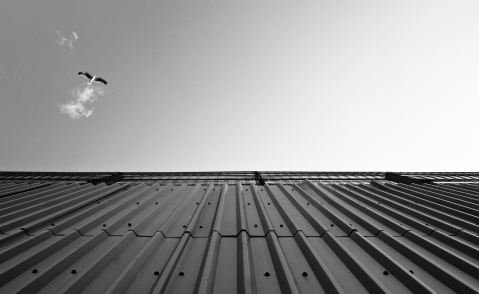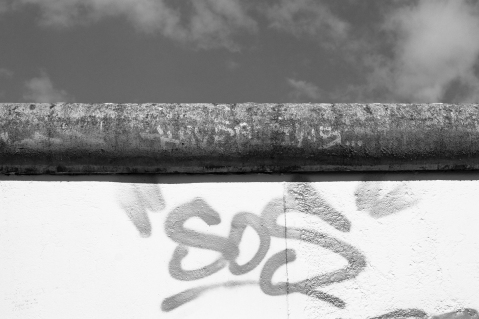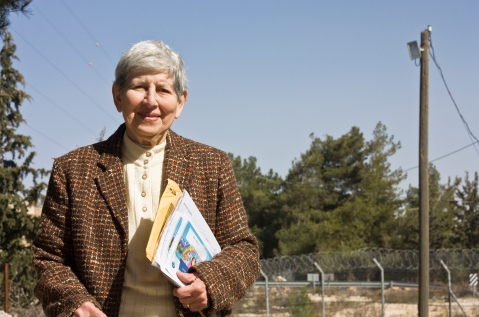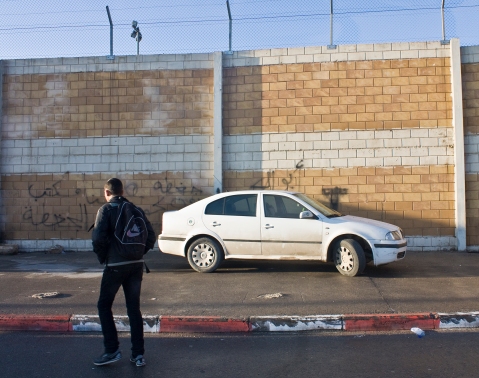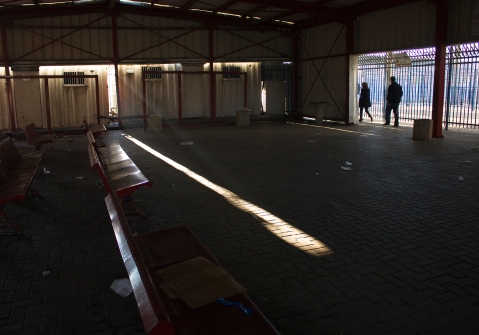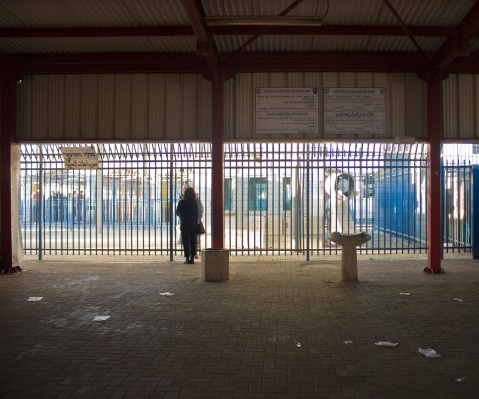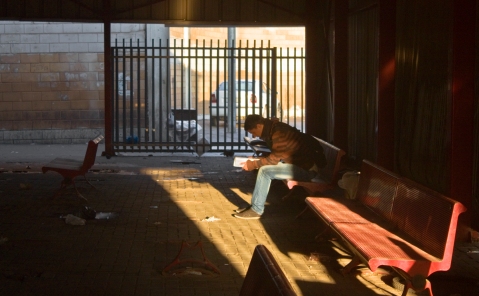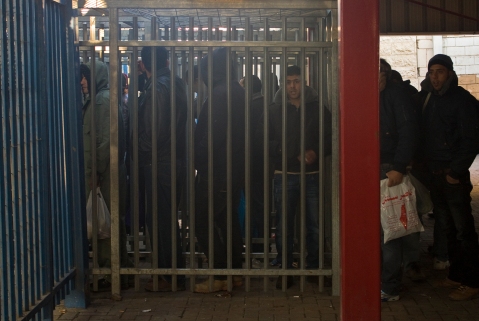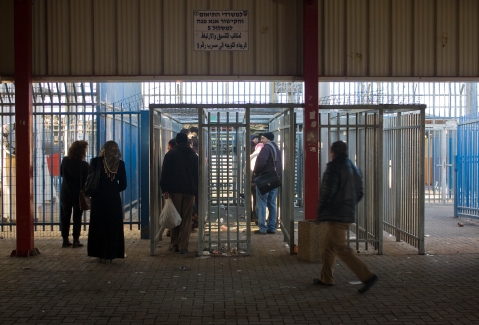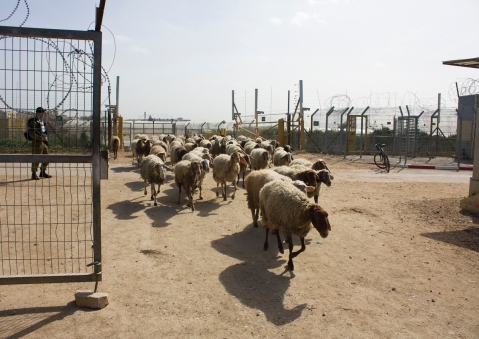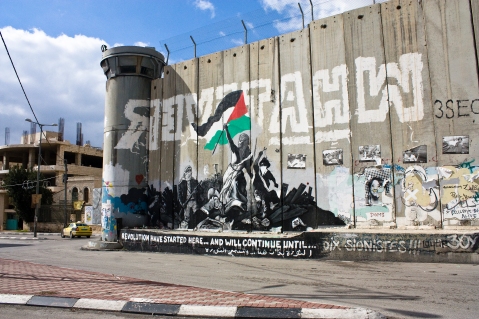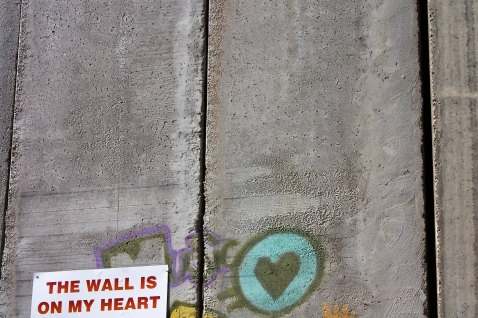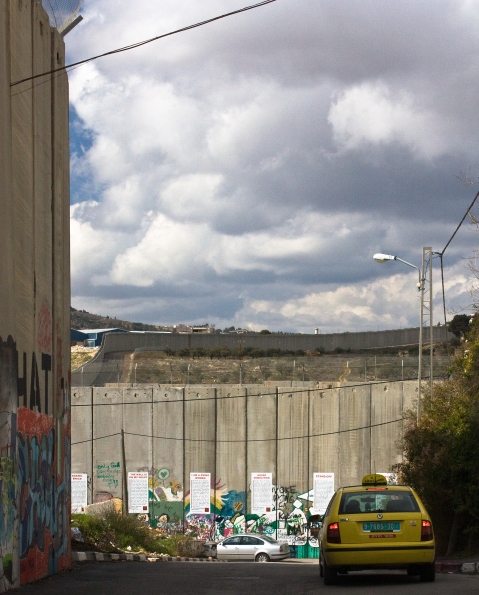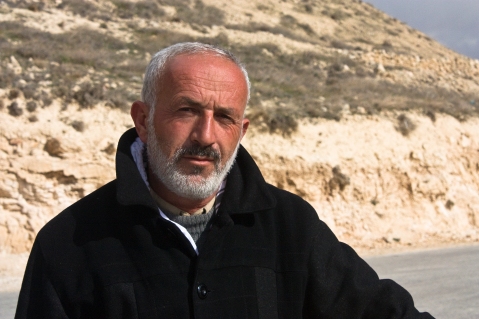Flashback to Beit Hanina, East Jerusalem
This Palestinian woman has lived in Beit Hanina, East Jerusalem since 1964. She only enjoyed her home for three years before a military base was built nearby, and the barbed wire began to snake through her neighborhood. Not long after, a settlement sprouted up across the street. The field where her children used to play is now filled with garbage and barbed wire stacked three rows high. This picture was taken in her driveway, not 50 meters from an Israeli fence. She said, in short, “it [the wall] is basically making life hell for Palestinians.”
Walajeh
The settlement of Har Gilo is creeping steadily onto Palestinian land and so the wall is still under construction in Walajeh, a tiny village just west of Bethlehem. I’m hoping to go back again before I leave, but here are a few pictures of the wall there. It’s so odd to see it half-built. There was nothing to stop me from walking on both sides save a 6-inch concrete block that foreshadows the arrival of its bigger incarnation.
This slideshow requires JavaScript.
“This is the only land we have and we love it”
Today I traveled to the village of Biddu to meet this man. His house, on the outskirts of the village, has been a flash point for clashes in his backyard and the courtroom for the last 9 years. In 2004, Israeli soldiers destroyed his grove of 123 olive trees and piled up rubbish around his house; they were claiming land for the construction of the wall. There was a scuffle. His father threw rocks, a brother was tackled and arrested. But in the end, the soldiers took the land and the family was devastated. But they fought back. For 9 years, they went to court every month, being gouged by an Israeli lawyer for his services, but without a foreseeable alternative, they trudged ahead. And miraculously, they won their case. The land was returned, they planted new olive trees a month ago. The trees are young and tender in freshly tilled dirt, and there’s no telling whether the bulldozers will return to uproot them. But for now, they are safe again.
I’m in Tel Aviv this week and went on an excellent Machsom Watch tour yesterday of the northern West Bank. I’m (mostly) taking a break from Walking Walls today, but I wanted to post this picture: sheep crossing an Agricultural Checkpoint near Qalqilya. More later.
The Wall: Pisgat Ze’ev/Sho’afat
This morning I went walking in the northeast part of Jerusalem, from the Jewish (settler) neighborhood of Pisgat Ze’ev to the Palestinian neighborhood Sho’afat. My route skirted along the Sho’afat refugee camp, which made for some striking, but sad views. 
Although Sho’afat Refugee camp is within the Jerusalem municipal boundary, the wall isolates it from the city. Most services are provided by UNRWA, not Israel, and the municipal infrastructure is astonishingly bad. There’s garbage everywhere because no one comes to pick it up. The houses are in bad shape, and 20,000 people are crammed into a neighborhood intended for 1,500. Thanks to the wall, it’s become sort of a lawless land that isn’t taken care of by Israeli or Palestinian police, with the exception of Border Police raids, checkpoints, and tax collection. It was shocking to see the state of the camp, while just 200 yards away, Jewish settlers live in comfortable, new apartments. Furthermore, while the vast majority of the Separation Barrier is fenced, there is a wall in urban areas to protect Israelis from gunfire, which was a legitimate problem in areas of Jerusalem during the Second Intifada. But here, there’s no way the wall would be effective at doing this. It seems to me that the wall is much more important visually and psychologically than it is in terms of security.
Check out Ir Amim’s webpage for more on the Sho’afat Refugee Camp and the wall.
East Jerusalem
This morning I went on a great tour of East Jerusalem with the Israeli NGO Ir Amim. I wanted to share a few quick edits yet today. We’re getting ready for Shabbat here, and although I’m not Jewish, the friends I’m staying with are, and I’m excited to do Shabbat with them. So no posting this evening or tomorrow.
Bethlehem
When I stepped off the bus in Bethlehem, I was immediately swarmed by taxi drivers looking for work. Slightly overwhelmed, I tried to wave off a few of them and walk down the street, but I ended up talking to one of them who offered to show me the wall, and I decided to take him up on it. For the next several hours, Yousef drove me around the city to see the sights, told me about the city’s recent history, and shared his perspective. It was invaluable, and I know I made the right call in hiring him.
Yousef smoked out the window of the cab as he told me about his seven sons, who are between the ages of 7 and 25. He’s sending them all to university, somehow, with his meager salary working two jobs, and some family help. In the mornings, he is an Arabic teacher at a local high school, which, apparently, is a persona he cannot shake in the afternoons. He tried his best to teach me a few words in Arabic, and quizzed me on what I’d recited at unexpected moments, like when I had just gotten back in the cab. In the end, only a few things stuck after I finally had the sense to break out my notepad and jot down phonetic notes and translations.
After seeing the city and stopping for prayer and postcards in Manger Square, we drove a ways out of town to a hill where I had a view of everything from Jerusalem to the Dead Sea. From there, the landscape looked rugged, unforgiving, unimaginably ancient. We could pick out Jewish settlers’ communities by their red tile roofs. They seemed more numerous than the Palestinian housing. A small Israeli military base kept watch near the road, ensconced in barbed wire. Yousef told me that if he were president, he would institute a one-state solution (with a presidency that rotated between Israelis and Palestinians) which was something I hadn’t heard before. When I mentioned it to Jesse later, he told me it was actually a pretty common idea among Palestinians.
After our excursion to the hill, Yousef invited me back to his home for tea. This is a very common gesture of hospitality and I was thrilled to accept. He taught me a few Arabic greetings for his family members and I managed to remember them during the short drive to his village. At the house, I got to meet 4 of his sons, and his wife, who prepared a delicious, traditional Palestinian soup in addition to mint tea. They were so welcoming and generous and I felt very comfortable in their home. Their youngest son, Akram, took this picture of myself, Yousef, and his wife using my camera. He was a pretty good photographer after a few tries and a quick lens change to account for the dim living room.
We headed back to the Bethlehem bus stop and parted ways. I was a little nervous about the checkpoint but didn’t have any trouble at all, but several other passengers were checked outside the bus. It was astonishing to see the security installations around the road to Bethlehem. Consisting of a tunnel, walls around the highway, numerous watchtowers, and a 5-lane checkpoint, the road between Bethlehem and Jerusalem is essentially a military fortress. These installations and accompanying laws have prevented Yousef from visiting the City of David since 2001 despite its proximity. Unfortunately this is a very, very common situation for Palestinians living in the West Bank.
A Look at Bethlehem
Here’s a quick photo from Bethlehem. More soon.
This day has been incredible. I just got back from an open mic where everyone was amazingly talented. Picked up a CD from a spoken word poet. Lots of song, performance, generally mind-blowing people and ideas. Lots of commentary on Jewish identity, some of which I understood, more of which I wish I did. Young Jerusalem expats are the best. I’m just too exhausted to say more now, but might lay awake thinking about everything for hours. Everything here is so intense, the pace of life is astonishing.
Recent Posts
Tag Cloud!
activism adventure Art beer Belfast Berlin Berlin Wall Bethlehem borders boston Buffer zone bus carleton college Catholic city cold war conflict Cyprus division east jerusalem europe flags Fresh Photo Friday geography Germany Graffiti Grafitti history Ireland Iron Curtain Israel Jerusalem Language maps middle-east military Neighborhoods Nicosia night night photography North Cyprus Northern Ireland occupation Olive trees Palestine Peace Walls philosophy photography Photojournalism Place Poland police politics protest Protestant river rome sculpture Separation Barrier shabbat Silwan snow Space story Tel Aviv transportation travel United Nations Walking Walls wall Walls West Bank words Work writingMy other websites
Archives
- November 2014
- April 2014
- January 2014
- November 2013
- September 2013
- August 2013
- June 2013
- April 2013
- March 2013
- February 2013
- January 2013
- December 2012
- November 2012
- October 2012
- September 2012
- August 2012
- June 2012
- May 2012
- April 2012
- March 2012
- February 2012
- January 2012
- December 2011
- November 2011
- October 2011


